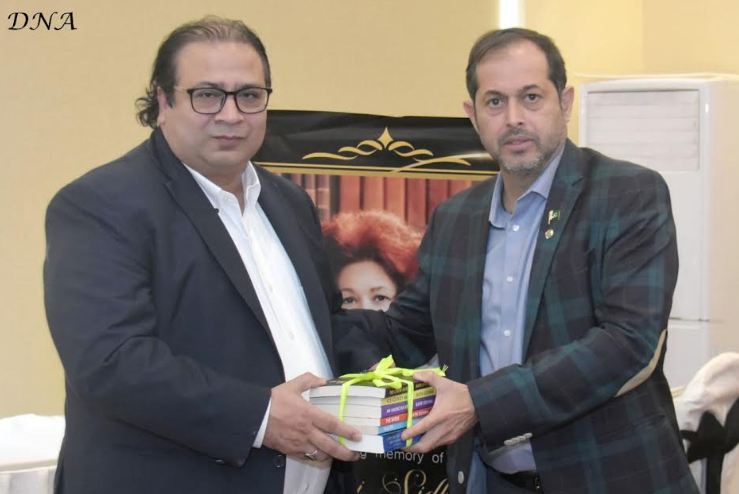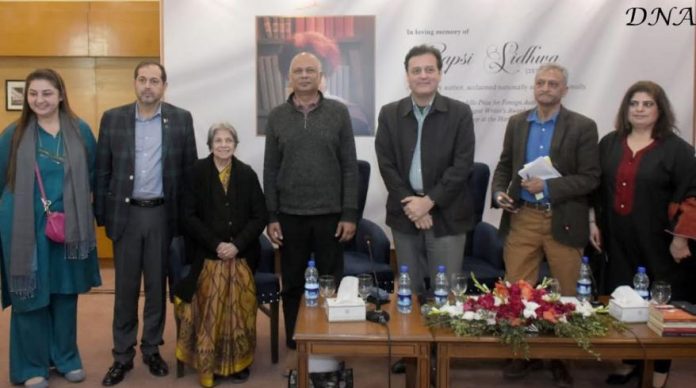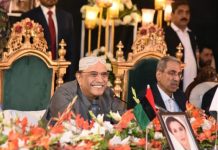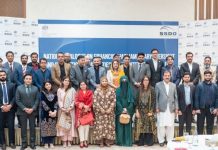The attendees reflected on her role in bringing Pakistani and Parsi literature to the global stage, emphasizing her ability to weave historical events into deeply personal and engaging narratives. Many highlighted how her writings provided a voice to the marginalized, particularly women, and explored the complexities of historical and social change
ISLAMABAD, 11 Feb: /DNA/ – An event to pay tribute to renowned Pakistani author Bapsi Sidhwa was held in Islamabad today, organised by her nephew, MNA Isphanyar M. Bhandara. MrBhandara is the only son of Ms Sidhwa’s brother the late Minoo Bhandara (1938-2008), and the CEO of their family business the Murree Brewery founded in 1861.

The event was held at the Multipurpose Hall of the Islamabad Club and was attended by Islamabad’s literary community as well as friends of the family. A panel of esteemed guests spoke at the event. They included MsPerin Boga, former literature and drama teacher at Kinnaird College for Women in Lahore and a family friend of Bapsi Sidhwa and the Bhandara family; Senator Walid Iqbal, whose parents Justice Javed Iqbal and Nasira Iqbal were also friends of Bapsi Sidhwa: Harris Khalique, Secretary-General/CEO of the Human Rights Commission of Pakistan (HRCP) and also an award-winning poet; and Dr Arif Azad who has written widely on culture, politics, and literature and is also a health and public policy consultant.
The event began with a welcome note by IsphanyarBhandara who remembered his aunt fondly. He recalled her relationship with her brother Minoo and praised her contribution to Pakistani literature in English. The MC of the afternoon’s proceedings Nilofar Afridi Qazi followed and invited the panel to take their seats.
The panel segment was curated by Amna R. Ali, who also moderated the discussion. MsPerin Boga began with a presentation about the milieu that Bapsi Sidhwa grew up in, the Parsi community to which she belonged and how her writing took flight. Pegging her presentation on some of the architectural delights of Lahore she provided a pictorial journey through Bapsi Sidhwa’s beloved Lahore augmented by images taken from FS Aijazuddin’s bookForgotten Images and the painting of Commercial Buildings by Ijaz Anwar. This was the city which nurtured Bapsi Sidhwa to write her first book The Crow Eaters in 1978, followed by The Bride in1982.
Senator Walid Iqbal recalled his parents’ friendship with Bapsi Sidhwa, reminding the audience that it was his father who helped Bapsi self-publish The Crow Eaters in Lahore before it was published in the UK, leading toMs Sidhwa’s international acclaim. Harris Khalique and Dr Arif Azad also shared their views on the themes of Bapsi Sidhwa’s work – the complexity of Partition, pluralism, women’s rights, the lives of minorities – and her rich storytelling that brought to life a wide gamut of characters and places.
Video tributes were sent in by FerozeBhandara, Bapsi Sidhwa’s younger brother who lives in Houston, Texas; Ameena Saiyid (OBE, SI), Publisher and Managing Director of Lightstone Publications and founder of Adab Festival; Muneeza Shamsie, editor and critic and the author of a literary history, Hybrid Tapestries and editor of four anthologies of Pakistani writing in English. And finally, Sadia Uqaili, a Pakistani American artist, and filmmaker, educator and activist, and the producer of Bapsi – a feature-length documentary on the life and work of Bapsi Sidhwa. This was followed by a six-minute clip of the documentary, some of it showing a snippet of Bapsi Sidhwa’s life in Houston, Texas, USA where she lived after leaving Pakistan.
The memorial reference ended with praise for Bapsi Sidhwa’s literary legacy and her impactful life which will inspire future generations for years to come.

















